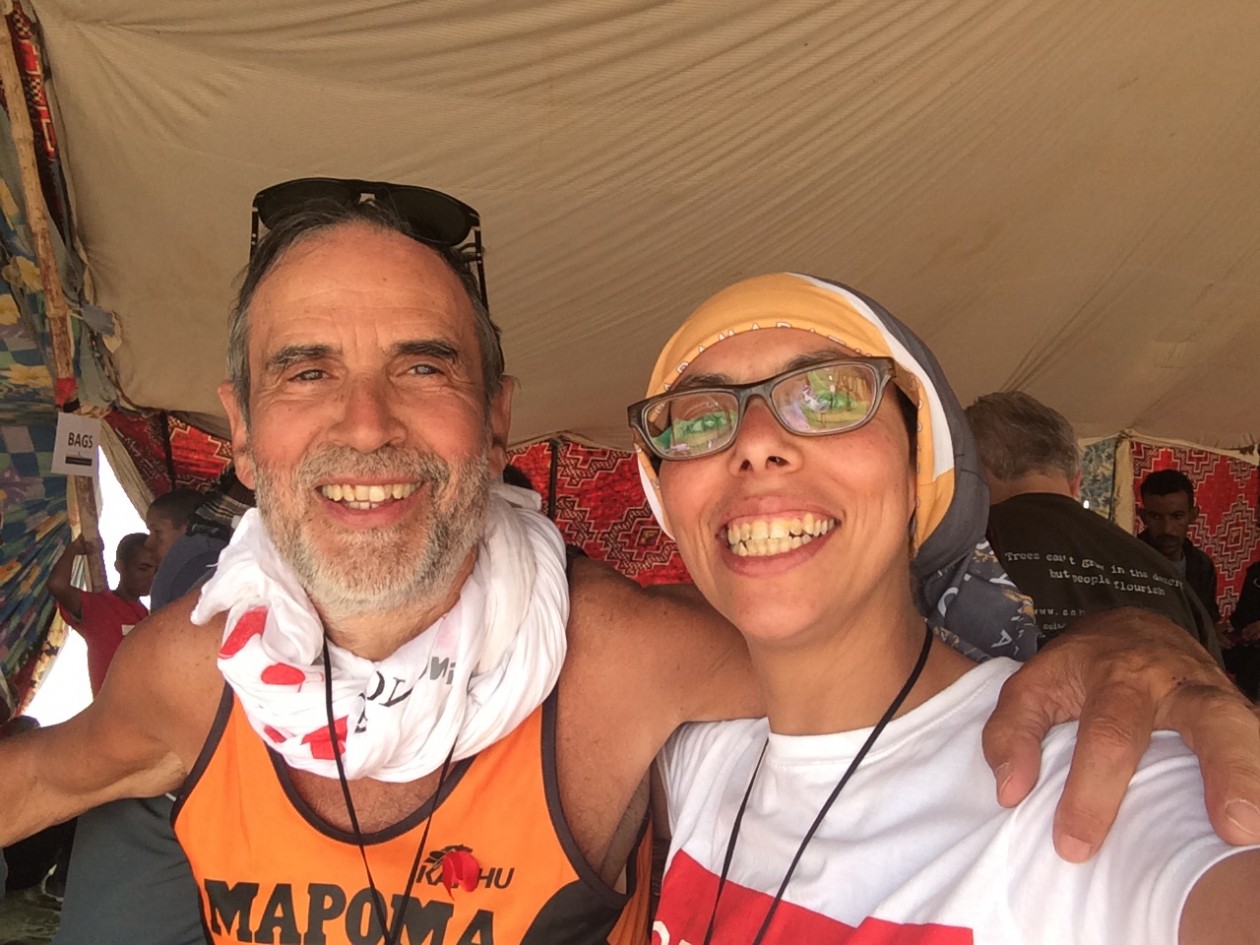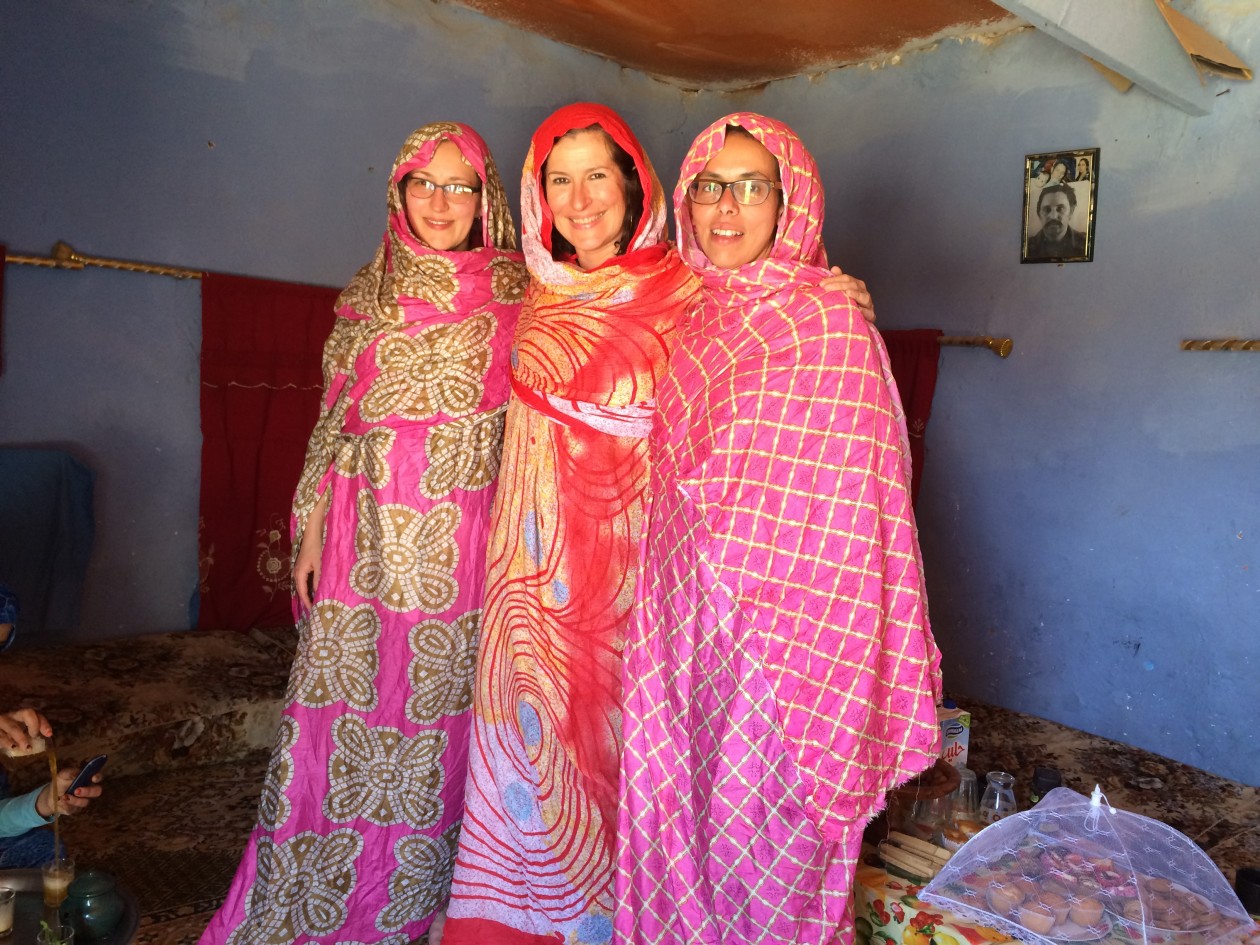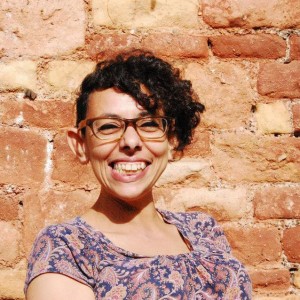What do you expect when going to a refugee camp?
30th April 2015A photo-animation and journal by Rasha Shaheen, Highlight Arts member, on running, music, and The Western Sahara refugee camps of Tindouf.
When I told my parents I was planning to do a Sahara marathon (half marathon actually but Sahara Half Marathon doesn’t sing so well) they asked me why? Where? With whom? & Why?
Lets start with ‘where?’
I was going to the Western Sahara refugee camps of Tindouf, Algeria. Living there are 100,000 Saharawis who have been uprooted from their homes in Western Sahara (directly below Morocco, N.W. Africa). There are 5 camps near Tindouf, Smara, Awsert, Boujdour, La’youn and Rabouni. This year was the 40th Anniversary of the camps. This is where the Sahara Marathon has been organised for the past 15 years.

The end of run with Juan Coca, one of the the Marathon organisers (Photo: Rasha Shaheen)
Why?
The Saharawi plight is not a well known one. I found out about it through my friend Elhum Shakerifar, producer of The Runner, a film based on Saharawi runner Saleh Amaidan. Having just taking up running, Elhum suggested (as anyone good friend would), that I sign up for the Sahara Marathon via Sandblast (an arts charity run by Danielle Smith aka Sahara switchboard).
The Western Sahara was part of the Spanish colonial empire until 1975 when it was divided up and given to Morocco (2/3) and Mauritania (1/3). Many Saharawis were treated as 2nd class citizens, and quite a few were tortured as they tried to resist their unwelcome new rulers. The Saharawis managed to negotiate with Mauritania and reclaim their land but have yet to do so with the Moroccan occupied territories. There was hope in 1991 when the UN promised a referendum however this did not come into fruition. The Saharawis who refused Moroccan citizenship, moved to the refugee camps of Tindouf. In response to their resistance, Morocco built the 2nd largest wall in the world, around the occupied territories, and planted over 100,000 land mines alongside the wall, making it the world’s longest continuous minefield.
I found out that Sandblast were raising money to build Studio-Live, a music studio in the camps. It combined music, education and running, the 3 elements of my day to day life. How could I refuse involvement? Also being Egyptian, it was time I ventured out to visit my neighbours.
With whom?
I travelled with singer songwriter and actress Pia De Keyser. I had offered my skills as an educator and sound engineer and was fortunate enough to arrive a week before the rest of the 500 runners and get to work in the studio. I worked alongside Shaia, our host and Saharawi sound engineering student. Working with Shaia was more of a collaboration. I had perhaps more studio experience, however Shaia drove the project with her Saharawi knowledge.
Our task was to record a 3 song collaborations in the camps, between Pia De Keyser and Saharawi musicians Mohamed Salem (tidinit player), Lamrabet (vocalist), Ayub (guitarist and vocalist) and Mohamed Salek (guitarist and vocalist), Tarba Bueibu (drummer) and The Ayoun Group (female vocalist trio). We aim to arrange, mix and master back in the UK, releasing the e.p. before the end of 2015. We are lucky to be working with a mastering engineer from Metropolis Studios, however we are still looking for a mixer so if anyone is interested, please do get in touch.
For a glimpse of the music, follow this link below. The little boy, El-Habib, loved the song so much, he was asking Pia to sing it for him everyday, so she got him to learn the strumming part.
The thinking behind the project with Pia and Sandblast, is to get more musicians who are sympathetic to the Saharawis, to come to the camps and record their music, to experience life in the camps and get a deeper understanding of the many challenges that feature in their day to day life. You get high quality recordings to take home and the recordings carry the Saharawi narrative wherever the music travels, helping to provide a platform for their voices to be heard, whilst at the same time, nurturing the camps’ creative economy.
The challenges pointed out many things I take for granted, for example the lack of dust where I live in the UK. On the day of our arrival at the camps, we went to prepare the studio for recording. It had not been used for over a year and a mound of sand had seeped in through the doors and settled in the middle of the room. We cleaned and unpacked the gear from heavy flight cases and tested the sound in preparation for the next day’s session. Wires had to be threaded through walls to link the live room with the control room. This is a lot of work and has to be done each time a project starts, in order to protect the equipment from heat and sand.
Electricity is another challenge. The studio is based in camp Boujdour, one of the only camps out of the four civilian camps to have electricity. This is a luxury, yet there are random surges and dips which means that all equipment needs to be filtered through a power surge protector. If the electricity dips below 120V, which it did a few times, we would have to stop recording and usually have tea with Omar, the arts compound security man.
One of our sessions was interrupted by a local school who asked to record a couple of demo songs to help the children practice for a performance. Even though we were potentially running out of time for our own recording schedule, we knew our session had to wait. The children were adorable and we loved hearing them sing. What I really loved was that community was more important than anything, and this echoed all other the camps. I don’t think it would be able to survive as well as it has without this spirit of working together.
One challenge we didn’t have to experience, was recording in the summer. I was brought up in Saudi Arabia and so I understand how harsh temperatures can affect you. I remember leaving my favorite Five Star cassette tape in my father’s car by accident and returning to find it unplayable and warped from the heat. Saudi is also drenched with air conditioners so again I was never forced to feel the full impact of midday summer heat, this is not a choice that a lot of Saharawis get to make.
Overall, my experience in the camps was a life affirming one. I had never been to a refugee camp before and I travelled with an open mind, wondering how I could help and I came back with so much more than I had offered. I was confused to be in a refugee camp and be having one of the most amazing times of my life. How can this harsh land provide me with such joy and fulfillment of life? The answer was down to being among the generous spirit of the Saharawis. They are maybe denied their land, and fighting to maintain their cultural identity but they are rich with love and have an abundance of sharp wit and sense of humour (shout out to Chamama our Saharawi guide). Their deep sense of community, their open-mindedness, their forward thinking and their politically activated mindset made me feel completely alive.
The organization within the camps is largely a matriarchal system which has fostered vital infrastructure and written a ‘constitution-in-exile’ which explicitly guarantees women’s rights. This maybe one of the reasons why I felt such progressiveness in the camps. I look forward to returning, and through Highlight Arts I look forward to creating more dialogue with and around the Saharawis and sharing their magnificent culture.
p.s I got a stitch mid run and had to walk the majority of the run and ending first (if you count backwards) however my run raised £1,129.77, plus a pair of brand new AKG C414s were donated by The Remix Academy, and a valve Rhodes mic donated by BIMM colleague Owen Vyse. All for Sandblast, which has got to be a good thing, right?

Pia De Keyser, Danielle Smith , Rasha Shaheen

Rasha Shaheen is a songwriter, performer, educator and music event coordinator. She has performed internationally since 1997 with many music projects (rasha.co.uk). Currently Rasha is creating an album for a new project guised under the name ∑nnth. She lectures at the British & Irish Modern Music Institute in Brighton & The University of East London, and is an ensemble leader for the Remix Youth Ensemble. Rasha is the London co-ordinator for Highlight Arctic.
w: rasha.co.uk





